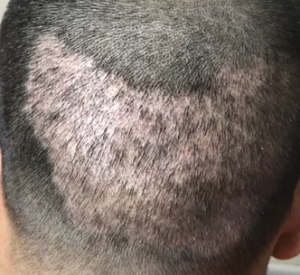Can I Have A Hair Transplant With A Damaged Donor
I had an FUE last year that left my donor area severely damaged and depleted. My procedure was a complete failure and now I’m left with a bald scalp and depleted donor area. Can I still have a strip surgery with a depleted donor area?
Sadly, there is no clear cut answer. It all depends on how depleted the donor area is. In some cases, patients are able to have a small strip procedure even after several Folliuclar Unit Excision (FUE) procedures. In other cases, patients are no longer able to withstand any further surgery without severely compromising their donor area.
In extreme cases of donor depletion, some surgeons resort to body hair transplantation (BHT). BHT is surgical technique that involves a surgeon removing hair from different areas of the body including the beard, chest and legs. The hair is extracted via FUE with the use of a surgical punch. There are some cosmetic differences between scalp hair and body hair.
For one, body hair has a shorter life cycle than scalp hair. Secondly, body hair does not grow more than a few centimeters, while scalp hair can grow several feet. Moreover, the shape, curl and texture of body hair is completely different than scalp hair. All of these factors combined make it very difficult for a hair transplant surgeon to naturally blend in body hair with scalp hair. That said, it can and has been done, but BHT should be a last resort after all of the available scalp hair has been used.
Unfortunately, this has become a common occurrence with many hair transplant patients. With the advent of FUE, many low-cost clinics are advertising hair transplant surgery at a very low cost. Sadly, naive and unsuspecting patients find themselves being duped in to having cheap surgery, that ends up being very costly.
In addition, these unscrupulous low-cost clinics hire fly-by-night technicians to carry out the entire procedure with little to no physician supervision. As a result, patients become just a number in a char rather than patient. After having a disastrous result that leaves patients heavily scarred and in some cases disfigured; patients find themselves with little to no recourse. This is why selecting a skilled, talented and experienced surgeon is crucial. Money comes and goes, but hair transplant results are forever.
Written and published by,
Melvin- Editorial Assistant and Forum Co-Moderator for the Hair Transplant Network and The Coalition of Independent Hair Restoration Physicians

